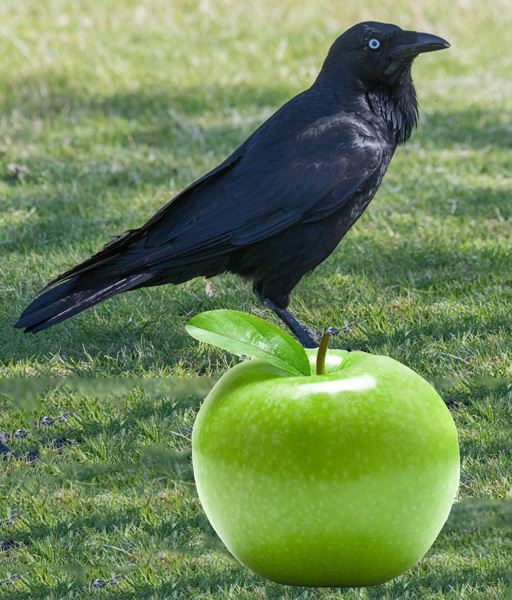The Raven Paradox
Why finding a green apple is evidence that all ravens are black.

Why finding a green apple is evidence that all ravens are black.

Finding a black raven is evidence for the statement that all ravens are black. Note that the statement, "All ravens are black" is logically equivalent to the statement, "All non-black things are not ravens". Finding a green apple is evidence for the latter statement. So far, so good.
Note that the the logical equivalence of the two statements means that finding a green apple is also evidence for the first statement. Thus we conclude that finding a green apple is evidence that all ravens are black. This is counter-intuitive, as apples and ravens seem to have nothing to do with each other. How can finding a green apple tell us anything about ravens?
This paradox has been around since Carl Hempel proposed it in 1937, yet philosophers do not agree on how to resolve it. Worse yet, some believe the green apple is evidence for black ravens, whereas others do not. Here is the wikipedia article.
You may want to give this paradox some thought before reading my proposed solution.
First a definition. Evidence is information indicating that a belief is valid, ie increasing its probability.
Why does evidence ever count in the first place? It counts because we expect repetition, patterns, regularity. We expect more of the same. Without regularity science would be impossible and we could never make sense of the world. So sighting a black raven makes us expect another black raven.
My answer to the paradox is that the green apple is indeed evidence that all ravens are black, but its value is so close to zero that it is in effect meaningless.
We have found one object that is not black and not a raven, so of all the possible candidates on earth for a non-black raven, this particular one is a negative. There is one fewer potential object that could be a non-black raven, raising the probability of all ravens being black. However, given that there are an astronomical number of objects on earth, the fact that we found one that supports our hypothesis is a vanishingly weak piece of evidence. It is far weaker than if we had found a black raven. There is a humungously large number of non-black non-ravens and we have found one of these. It is evidence, but extremely weak evidence, so weak as to be utterly inconsequential.
There is nothing special about black. Pink would do just as well. We can say that the green apple is evidence that all non-pink objects are not ravens, and hence that all ravens are pink. And so on for every colour except green. So the green apple is equally a piece of evidence for the hypothesis that all ravens are pink, or that all are blue, or that all are yellow, or any other colour we care to name, except green. In other words, the apple does not indicate that ravens are black rather than some other colour (except green). This further dilutes the value of the evidence.
Note that if instead of the green apple we had found a piece of black tar, this would not be evidence that all ravens are black.
Suppose our hypothesis were that the President of the US wears a panama hat. This is equivalent to "All people who do not wear a panama hat are not the President of the US." Each time we encountered a person not wearing a panama hat, we would be accumulating evidence in support of our hypothesis. Yet even after seeing billions of people who do not wear panama hats, we would still only have extremely weak evidence that the President wears such a hat. Such evidence would not convince anyone to believe our hypothesis. This almost equivalent example shows how vanishingly small is the weight of evidence provided by the green apple in favour of the hypothesis that all ravens are black. Even seeing trillions of green apples would not carry any weight for a rational person.
Intuitively, it is hard to see why the green apple counts as evidence at all. It is simply that by looking for non-black ravens and failing to find them we are increasing the probability that they do not exist.
PS I believe the answer given above is correct. I had previously posted a different answer to the paradox, which I now think was mistaken.